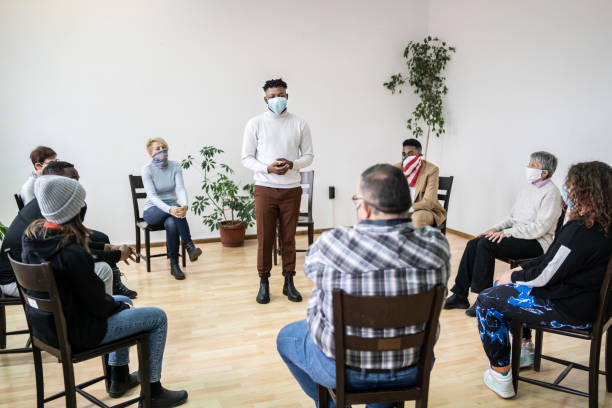Stress is an unavoidable part of our daily lives, but sometimes it can become overwhelming and lead to mental and physical health issues. One effective way to do so is through stress group therapy. This type of therapy provides a safe and supportive environment where individuals can share their experiences and learn coping strategies from one another. In this blog, we’ll explore the benefits of stress group therapy and how it can help individuals reduce their stress levels and improve their overall quality of life.
Contents
What Is The Group Therapy For Stress?
Group therapy for stress involves a small group of individuals who come together to share their experiences and learn coping strategies to manage their stress levels. The group is typically led by a trained therapist who provides guidance and facilitates discussions among the participants. The ultimate goal of this type of therapy is to help individuals build resilience and develop coping strategies to manage their stress levels in a healthy and effective way.
Can Group Therapy Help With Stress?

Yes, group therapy can be very helpful in managing stress. In fact, group therapy is often recommended as a first-line treatment for stress-related issues. Here are some of the ways in which group therapy can help:
- Provides a sense of community and support: Being part of a group can help individuals feel less isolated and alone in their stress. Through this, individuals can connect with others with similar experiences, and offer each other support and understanding.
- Offers validation: In this therapy setting, individuals can share their experiences and feelings related to stress and receive validation from others who have been through similar experiences. This can help individuals feel heard and understood and reduce feelings of shame or isolation.
- Teaches coping strategies: This can be an effective way to learn new coping strategies for managing stress. Therapists can introduce different techniques such as relaxation exercises, mindfulness, or cognitive-behavioral strategies that individuals can practice and apply in their daily lives.
- Encourages accountability: In this therapy setting, individuals can set goals for managing their stress and hold each other accountable. This can be a motivating factor for individuals to continue working on their stress management outside of therapy.
- Provides a safe space to practice social skills: For some individuals, stress can make social situations difficult. Individuals can practice social skills and receive feedback in a safe and supportive environment.
Overall, group therapy can be a valuable tool for individuals looking to manage their stress in a healthy and effective way.
Types Of Group Therapy For Stress
There are many techniques that can be useful in group therapy for stress, depending on the needs and preferences of the group members. Here are some common techniques that may be used:
- Cognitive-behavioral therapy: CBT is a well-established therapy that focuses on changing negative thought patterns and behaviors. In group therapy for stress, CBT techniques help individuals identify and challenge negative thoughts related to depression, and to learn new behaviors that can help them manage their stress more effectively.
- Mindfulness: Mindfulness is the practice of being present and fully engaged in the current moment. In group therapy for stress, mindfulness techniques are useful for individuals to learn to focus on the present moment and let go of worries about the future or regrets about the past.
- Relaxation techniques: Relaxation techniques, such as deep breathing, progressive muscle relaxation, or guided imagery, can be used in group therapy for stress to help individuals learn to relax their bodies and reduce physical symptoms.
- Stress reduction exercises: This may include exercises such as yoga, tai chi, or other physical activities that can help individuals reduce their stress levels and improve their overall well-being.
- Interpersonal therapy: IPT is a type of therapy that focuses on improving relationships and interpersonal communication. In this therapy, IPT techniques help individuals learn to express their needs and feelings in a healthy way and to develop stronger, more supportive relationships with others.
Overall, group therapy for stress may use a variety of techniques to help individuals manage their stress levels in a healthy way. The specific techniques used will depend on the needs and preferences of the group members, as well as the expertise and training of the therapist leading the group.
Finding The Right Group Therapy For Managing Stress

Finding the right group therapy for managing stress can be a crucial step in the process of effectively managing your stress levels. Here are some tips to help you find the right option:
- Consult with a mental health professional: If you are not sure what type of group therapy would be best for you, it may be helpful to consult with a mental health professional. They can provide guidance and recommendations based on your individual needs and preferences.
- Look for groups that specialize in stress management: Some group therapy programs may focus specifically on stress management techniques, such as mindfulness or relaxation techniques. Look for groups that specialize in stress management if that is a priority for you.
- Consider the format of the group: It can take many different formats, such as open-ended or time-limited groups, or groups that focus on specific topics or issues. Consider which format would be most beneficial for you.
- Check for compatibility: It’s important to feel comfortable and safe in a group therapy setting. Consider factors such as the size of the group, the age range of the participants, and the group dynamics to ensure that the group is a good fit for you.
- Evaluate the qualifications of the therapist: Ensure that the group is led by a trained and licensed mental health professional with experience in group therapy.
- Consider practical factors: Consider the location, schedule, and cost of the group therapy program to ensure that it is practical for you.
Overall, finding the right group therapy for managing stress may take some research and evaluation, but it can be a valuable investment in your mental health and well-being.
Conclusion
In conclusion, group therapy for stress can be a valuable tool for individuals looking to manage their stress levels in a healthy and effective way. Through this therapy, individuals can connect with others who have similar experiences, learn new coping strategies, receive validation and support, and hold each other accountable for managing their stress. Overall, by working together in a group setting, individuals can build resilience and improve their overall well-being.
For more information, please contact MantraCare. Stress can have both physical and mental effects on the body, leading to negative consequences such as anxiety, depression, and even physical illnesses. If you have any queries regarding Online Stress Counseling experienced therapists at MantraCare can help: Book a trial Stress therapy session


